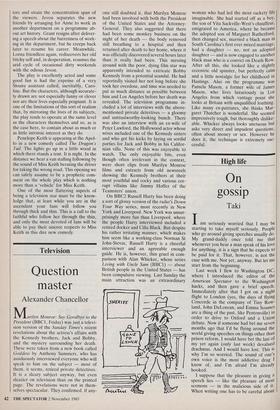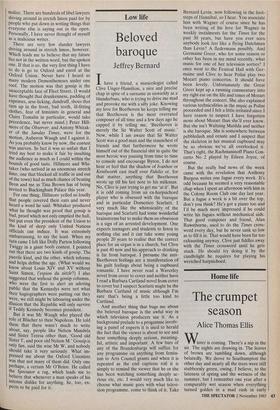High life
On gossip
Taki
Iam seriously worried that I may be starting to take myself seriously. People who go around giving speeches usually do. My grand-daddy once told me that whenever you hear a man speak of his love for anything, it is a sign that he expects to be paid for it. That, however, is not the case with me. Not yet, anyway. But let me start from the beginning.
Last week I flew to Washington DC, where I introduced the editor of the American Spectator to the Washington hacks, and then gave a brief speech. Immediately after that I got on a night flight to London (yes, the days of flying Concorde in the company of Tiny Row- land, John DeLorean, and Emma Soames are a thing of the past, like Pentonville) in order to drive to Oxford and a Union debate. Now if someone had bet me seven months ago that I'd be flying around the world giving speeches on things other than prison reform, I would have bet the last of my yet again (only last week) devalued drachmas. And I would have lost. This is why I'm so worried. The sound of one's own voice is the most addictive drug I know of, and I'm afraid I'm already hooked.
I suppose that the pleasure in giving a speech lies — like the pleasure of most sermons — in the malicious side of it. When writing one has to be careful about
malice. There are hundreds of libel lawyers driving around in stretch limos paid for by people who put down in writing things that everyone else is saying out in the open. Personally, I have never thought of myself as a malicious writer.
There are very few slander lawyers driving around in stretch limos, however. Which leads me to believe that my future lies not in the written word, but the spoken one. If that is so, the very first thing I have to do is go to Oxford and enrol at the Oxford Union. Never have I heard so many modern Demostheneses under one roof. The motion was that gossip is the unacceptable face of Fleet Street. (I would have thought that drunkenness, padding of expenses, arse-licking, dandruff, shoes that turn up in the front, bad teeth, ill-fitting clothes, fear of feminists in general and Claire Tomalin in particular, would take precedence, but never mind.) Peter Hill- more of the Observer, and Antony Whitak- er of the Sunday Times, were for the motion, Auberon Waugh and I against it. As you probably know by now, the contest was uneven. In fact it was so unfair that I tried my best to make it fair by insulting the audience as much as I could within the bounds of good taste. Hillmore and Whi- taker (who arrived in an enormous stretch limo, one that blocked all traffic in and out of the town) had as much chance of beating Bron and me as Tina Brown has of being invited to Buckingham Palace this year.
For one thing, Hillmore yelled so loudly that people covered their ears and never heard a word he said. Whitaker produced what he thought was proof that gossip is bad, proof which not only emptied the hall, but put even the president of the Union to the kind of sleep only United Nations officials can induce. It was extremely embarrassing, to say the least. When my turn came I felt like Dolly Parton following Twiggy in a giant boob contest. I pointed out that there are two kinds of gossip. The puerile kind, and the other, which informs and helps define the age. (What would we know about Louis XIV and XV without Saint Simon, l'espion du siecle?) I also suggested that without the gossip columns, Who were the first to alert an adoring public that the Kennedys were not what their hagiographers were putting out they were, we still might be labouring under the illusion that the Republic will only survive if Teddy Kennedy becomes president. But it was Mr Waugh who played the role of Blucher to their Napoleon. He told them that there wasn't much to write about, say, people like Nelson Mandela and Sister Teresa other than, 'Good old Sister T, and poor old Nelson M.' Gossip is Only fun, said the wise Mr W, and nobody should take it very seriously. What im- pressed me about the Oxford Unionists was that not many of them did. Only one Perhaps, a certain Mr O'Brien. He called the Spectator a rag, which leads me to believe that whenever a man speaks of his intense dislike for anything, he, too, ex- pects to be paid for it.























































 Previous page
Previous page